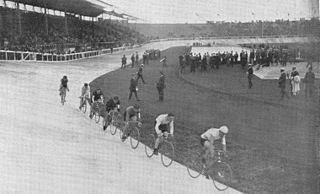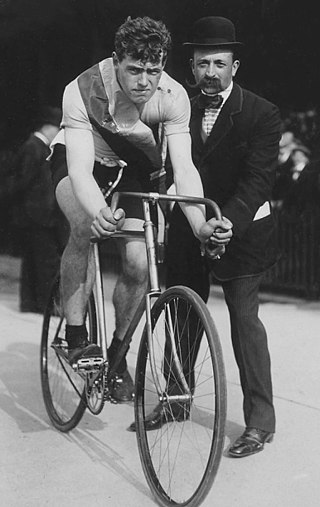Background
From 1896 to 1924 (excluding 1912, when no track events were held), the track cycling programme included events at a variety of distances that changed from Games to Games and ranged from the 1⁄4-mile to the 100 kilometres (and, even longer, the unique 12 hours race in 1896 that saw finishers exceed 300 kilometres). The 100 kilometres was held twice: in 1896 and again in 1908. The favorite in 1908 was Leon Meredith of Great Britain, who had won the world championship in 1904, 1905, and 1907 (and would win again in 1908, 1909, 1911, and 1913). [1]
France, Germany, Great Britain, and Greece made their second appearance in the event, having competed previously in 1896 (along with Austria). Belgium, Canada, Italy, the Netherlands, South Africa, Sweden, and the United States made their only appearance in 1908.

Keirin – literally "racing cycle" – is a form of motor-paced cycle racing in which track cyclists sprint for victory following a speed-controlled start behind a motorized or non-motorized pacer. It was developed in Japan around 1948 for gambling purposes and became an official event at the 2000 Olympics in Sydney, Australia.

The 1900 Summer Olympics were held as part of the 1900 World's Fair, during which many cycling events were contested. The IOC website currently affirms a total of 3 medal events, after accepting, as it appears, the recommendation of Olympic historian Bill Mallon regarding events that should be considered "Olympic". These additional events include the men's points race. Thus, three cycling events are considered Olympic events. These three competitions were held between 9 September and 16 September 1900. The cycling part of the World's Fair included 250 competitors, 160 of them French. In the sprint and 25 km events, 72 competitors, all men, from seven nations competed.

The men's individual road race was a cycling event at the 2004 Summer Olympics. It was held on 14 August 2004. There were 144 competitors from 43 nations. The maximum number of cyclists per nation had been set at five since professionals were allowed in 1996. The event was won by Paolo Bettini of Italy, the nation's first victory in the men's individual road race since 1992 and fifth overall. Sérgio Paulinho's silver was Portugal's first medal in the event. Belgium earned its first medal in the men's road race since 1964 with Axel Merckx's bronze.

Cycling has been contested at every Summer Olympic Games since the birth of the modern Olympic movement at the 1896 Summer Olympics, at which a road race and five track events were held. Mountain bike racing entered the Olympic programme at the Atlanta Olympics, followed by BMX racing in 2008 and freestyle BMX in 2020. Before the 2020 Summer Olympics, all events were speed races, but the 2020 programme featured BMX freestyle for the first time.

The men's time trial was one of 5 track cycling events on the Cycling at the 1896 Summer Olympics programme. It was the fourth event on the cycling schedule and was held on 11 April. The first time trial competition was the only time that Olympic time trials were held over the distance of one-third of a kilometre; when the event returned to the programme at the 1928 Summer Olympics the distance was set at one kilometre.

The men's 10 kilometres was one of the five track cycling races on the Cycling at the 1896 Summer Olympics programme. It was held on 11 April and comprised 30 laps of the track. The 1896 Games was the only time that the 10 kilometres track race was part of the cycling program at an Olympic Games. Six cyclists from four nations competed. The event was won by Paul Masson of France, the second of his three victories that day. His countryman Léon Flameng finished second, while Austrian Adolf Schmal was third.

The men's 100 kilometres was one of five track cycling events on the Cycling at the 1896 Summer Olympics programme. It was the first race held, on 8 April. It required cyclists to complete 300 circuits of the track. Nine cyclists from five nations competed. The event was won by Léon Flameng of France, with Georgios Kolettis of Greece coming in second.

The men's 12 hour race was one of five track cycling events on the Cycling at the 1896 Summer Olympics programme. It was the final event of the 1896 Summer Olympics, ending at 5 p.m. on 13 April. Seven cyclists from four nations started. The event was won by Adolf Schmal of Austria, the only gold medal in cycling ever won by the nation, until Anna Kiesenhofer's win in the 2020 Women's Road Race. Schmal lapped silver medalist Frederick Keeping of Great Britain early, winning by that lap as the two were the only riders to finish. The 12 hour race was the last event to finish at the 1896 Games.

The men's 25 kilometres was one of three cycling events, all track cycling, on the Cycling at the 1900 Summer Olympics programme that were open to all amateurs, had more than one nation participating and no handicapping. It was held on 15 September. Ten cyclists competed. Four had already competed in the sprint event. The result of the race proved Louis Bastien of France to be the top long-distance cyclist present, while Lloyd Hildebrand finished in second and Auguste Daumain in third. One of the contestants, Louis Trousselier, would go on to win the 1905 Tour de France. Prizes were awarded to the top four finishers: art objects valued at 400 francs, 300 francs, 200 francs (third), and 100 francs (fourth).

The men's 20 kilometres was one of seven track cycling events on the Cycling at the 1908 Summer Olympics programme. Its distance was the second longest of the individual event distances. Each nation could enter up to 12 cyclists.

The men's 1000 metre sprint was one of seven track cycling events on the Cycling at the 1908 Summer Olympics programme. Its distance was the second shortest of the individual event distances. Each nation could enter up to 12 cyclists.
Ernest Payne was an English track cycling racer. Born in Worcester, he won a gold medal in the team pursuit at the 1908 Summer Olympics in London for Great Britain and went on to play football, including two games as an amateur for Manchester United.

The men's points race was an event at the 1992 Summer Olympics in Barcelona, Spain. There were 38 competitors from 38 nations, with 24 cyclists competing in the final. Each nation was limited to one cyclist in the event. The event was won by Giovanni Lombardi of Italy, the nation's first victory in the event since 1900 and second victory overall; Italy was the first nation to have two wins in the men's points race. Léon van Bon gave the Netherlands its second consecutive silver in the event. Bronze went to Cédric Mathy of Belgium.

The men's points race was an event at the 2000 Summer Olympics in Sydney, Australia. There were 23 participants from 23 nations competing in the final, which was held on 20 September 2000. Each nation was limited to one cyclist in the event. The event was won by Joan Llaneras of Spain, the nation's first medal in the men's points race. Silver went to Milton Wynants of Uruguay and bronze to Aleksei Markov of Russia; those nations also earned their first medals in the event.

The men's individual road race at the 1952 Summer Olympics was held on 2 August, the 2nd last day of the Olympics on an 11,2 km course running counter-clockwise from Käpylä through Pakila and Maunula and back to Käpylä. The course was circled seventeen times, so the total length of the competition was 190,4 km. About half of the road was hard-surfaced, the other half sand-surfaced. There were 154 entries from 31 nations and 111 participants from 30 nations. Each nation could enter up to four cyclists; nations entering at least three cyclists had the scores of their best three finishers summed for the team road race event. The individual event was won by André Noyelle of Belgium, the nation's first victory in the men's individual road race. His teammate Robert Grondelaers took silver. Edi Ziegler earned Germany's first medal in the event since 1896 with his bronze.

Leonard "Leon" Lewis Meredith was a British track and road racing cyclist who competed in the 1908 Summer Olympics, in the 1912 Summer Olympics, and in the 1920 Summer Olympics. He won seven world championships, set up one of Britain's largest cycle-parts companies, and ran a roller skating rink and ballroom.
The men's Madison at the 2008 Summer Olympics was held on 19 August at the Laoshan Velodrome.

The men's sprint cycling event at the 1932 Summer Olympics took place on August 1 and 3. The format was a sprint of 1000 metres. There were nine competitors from nine nations, with each nation limited to one cyclist. The event was won by Jacobus van Egmond of the Netherlands, the nation's second victory in the men's sprint. It was the fourth consecutive Games that the Netherlands reached the podium in the event. France made the podium for the third consecutive Games, with Louis Chaillot taking silver. Bruno Pellizzari gave Italy its first men's sprint medal with his bronze.

The men's track time trial in Cycling at the 1996 Summer Olympics was a time trial race in which each of the twenty cyclists attempted to set the fastest time for four laps of the track. The race was held on Wednesday, July 24, 1996 at the Stone Mountain Velodrome. There were 20 competitors from 20 nations, with each nation limited to one cyclist. The event was won by Florian Rousseau of France, the nation's first victory in the men's track trial since 1968 and fourth overall. Erin Hartwell of the United States took silver, becoming the fourth man to win multiple medals in the event. Japan won its first track time trial medal with Takanobu Jumonji's bronze.

The men's individual road race at the 1960 Summer Olympics in Rome, Italy, was held on 30 August 1960. There were 142 participants from 42 nations. Each nation could enter up to four cyclists. Of the 142 starters 76 rode the distance to the end. The event was won by Viktor Kapitonov of the Soviet Union, the nation's first medal in the event. Livio Trapè of Italy took silver, putting that country on the podium for the second consecutive Games. Willy Vanden Berghen's bronze gave Belgium its fourth medal in four Games.
















